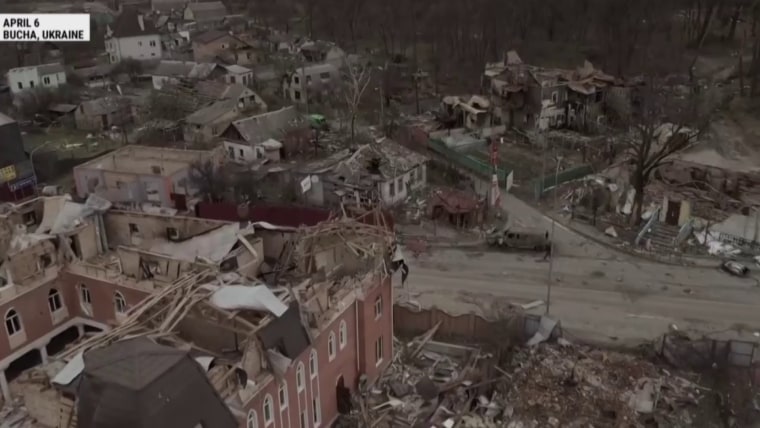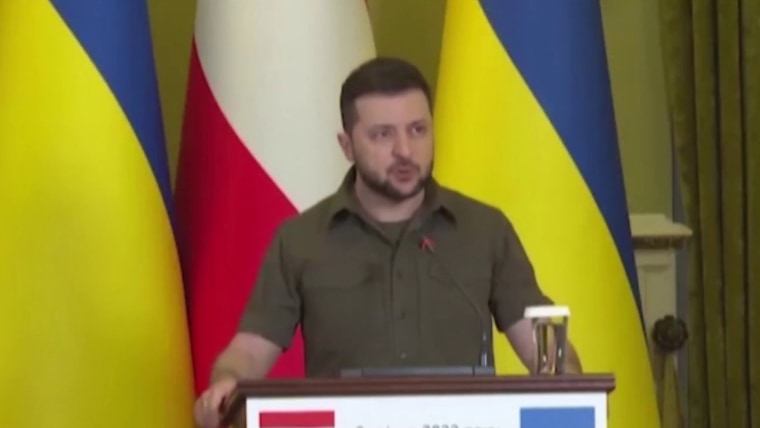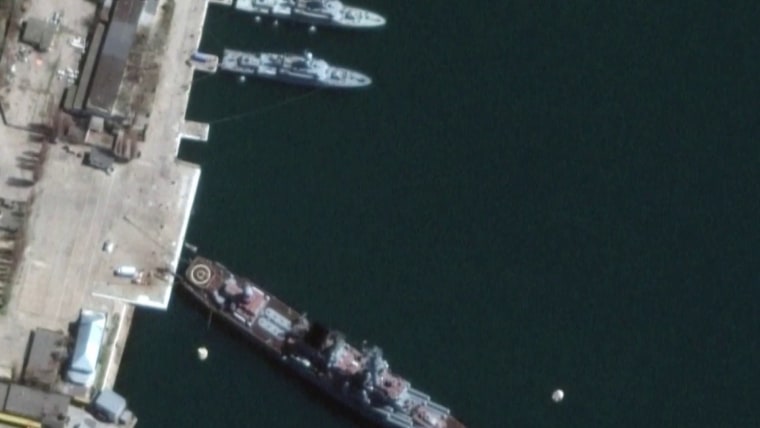President Joe Biden’s declaration this week that Russia is committing “genocide” in Ukraine raised concerns among some officials in his own government and has so far not been corroborated by information collected by U.S. intelligence agencies, according to senior administration officials.
At the State Department, which is tasked with making formal determinations of genocide and war crimes through an independent legal process, two officials said that Biden’s seemingly offhand declaration during a domestic policy speech in Iowa on Tuesday made it harder for the agency to credibly do its job.
U.S. intelligence agencies collect information when allegations are made of actions that could amount to genocide, but policymakers are the ones who actually decide whether to declare it. Intelligence reports on Ukraine currently do not support a genocide designation, officials said.
“Genocide includes a goal of destroying an ethnic group or nation and, so far, that is not what we are seeing,” a U.S. intelligence official said.
There is concern within the intelligence community, however, that Russia’s actions in the next phase of the war could amount to genocide, and one official said that assessment could be part of what prompted Biden to take a public position that’s ahead of his own government.
April 13, 202207:04
The question of when to label Russia’s actions in Ukraine “genocide,” particularly the legal threshold for doing so had been discussed inside the White House ever since images of mass graves and civilian torture and assassinations emerged in Bucha, people familiar with the discussions said. Biden had recently begun to make his views clear in private, so White House officials weren’t surprised that he called what’s happening in Ukraine “genocide,” but they were taken aback that he did so offhandedly in a speech in Iowa about inflation, the people said.
A spokesperson for the White House National Security Council said, “We are actively working to assist national and international efforts to document and investigate credible reports of atrocities, analyze the evidence, and identify any Russians responsible for the atrocities and war crimes that have been committed in Ukraine so they can be held accountable.”
In a statement, a State Department spokesperson said, “We will follow the facts and the law wherever they lead.”
The president’s declaration of genocide in Ukraine was the third time in recent weeks that the president has tried to separate what he says are his personal views from official U.S. policy to take a position that he believes is right even though it’s not aligned with the position of his own government.
Biden said Russia was committing war crimes in Ukraine — another symbolically and legally significant moment in which he got ahead of his own administration — a week before the U.S. government completed its legal process and formally made that declaration.
Biden also said Russian President Vladimir Putin should no longer be in power, prompting a scramble by his aides to say that’s not what he meant and stress that U.S. policy is not regime change in Moscow. Biden later said he did mean what he said — that it was his “personal” view — but not U.S. policy.
April 13, 202202:55
In clarifying that he was expressing his personal view by calling the situation in Ukraine genocide, Biden said “more evidence is coming out” on Russia’s actions there. “And we’re going to only learn more and more about the devastation,” he said. “And we’ll let the lawyers decide internationally whether or not it qualifies, but it sure seems that way to me.”
While some officials met Biden’s comments with trepidation, particularly after his aides had stressed the lengthy legal due diligence that’s required to make such a designation, others welcomed his public declaration, officials said.
People familiar with the internal discussions said Biden has felt that he and his aides were too slow to call out Russia’s actions in Ukraine as war crimes and label Putin a war criminal, and he didn’t want to be behind on what he believes is genocide.
The president believes Ukraine is a crisis evolving too fast to move at the pace of bureaucracy, these people said. So while administration officials debate these issues and work through laborious legal processes, he’s felt the need to speak out to reflect the moment, they said, and has believed history will prove him correct.
“These aren’t gaffes,” said one person close to the White House. “He’s doing this very purposefully.”
Responding to questions about Biden’s genocide declaration, White House press secretary Jen Psaki told reporters this week, “The president was calling it like he sees it, and that’s what he does.”
April 15, 202202:45
The apparent disconnect between the president and the bureaucracy he oversees is striking given Biden’s extensive experience in foreign policy and government. Biden also has stressed since the 2020 campaign that “the words of a president matter.” And he’s gone out of his way to say he would not try to influence independent Justice Department decisions, but some administration officials see a willingness for him to do just that with other independent legal processes.
Once the president says he believes genocide and war crimes have been committed, administration officials said that puts immense pressure on career government officials to reach the same conclusion. The concern is that if and when the State Department’s Office of Global Criminal Justice reaches those conclusions on its own, the office risks appearing late to the game or like it’s trying to justify Biden’s public comments, the officials said.
One of the administration officials said Biden’s comments had put particular pressure on Beth Van Schaack, the U.S. ambassador for global criminal justice, who was confirmed by the Senate last month. On Friday, Schaack met with Ukraine’s prosecutor general, Iryna Venediktova, to compare notes as Venediktvoa’s office investigates alleged Russian war crimes by Russia. Venediktova, like Ukrainian President Volodymyr Zelenskyy, has already accused Russia of genocide in Ukraine.
U.S. intelligence shows that the Russians have been told that Ukrainians in the eastern Donbas region, where fighting is expected to intensify, are Nazis and that the Ukrainian civilians are Nazi sympathizers, raising concerns about genocide, officials said. The Russians also have been told the same about Ukrainians in Mariupol, officials said, with one noting how brutal Moscow’s military campaign has been there.
Genocide is a specific crime defined under international law, and proving it requires showing an intent at high levels to commit genocide.
Biden’s early accusation against Russia, which was welcomed by Zelenskyy, came even ahead of human rights organizations that have often pushed U.S. administrations to declare that a regime has committed genocide.
Human Rights Watch, for instance, so far has not found evidence of a genocidal campaign waged by Russia, according to Tara Sepehri Far, acting deputy director of Human Rights Watch’s Washington office.
“Our research is not matching the definition yet,” said Sepehri Far. “It doesn’t mean it’s not happening.”
Biden has throughout his decades long career at times been quicker than others in the U.S. government to speak out about genocide.
As a U.S. senator — whose words carried weight, but not as much as the commander in chief’s — he was often ahead of his colleagues. In June 1994 as the Clinton administration avoided saying the mass killing in Rwanda was genocide, Biden, then a senator, joined other Senate Foreign Relations Committee members in insisting it was.
“Reliable — indeed, uncontradicted — reports prove that this is, in fact, a planned campaign of genocide,” the senators wrote in a joint letter.
Around that same time, Biden was among the more forceful voices in U.S. politics urging a strong international intervention in the war in Bosnia. In June 1994 Biden joined Sen. Bob Dole, R-Kan., in visiting Sarajevo, then under siege. The next year, Biden co-sponsored Dole’s landmark legislation lifting the U.S. arms embargo on Bosnia and Herzegovina. A decade later, Biden was one of eight co-sponsors of legislation commemorating the Srebrenica massacre as genocide.
April 15, 202201:54
Last year, Biden became the first president to formally recognize the mass slaughter of Armenians during World War I as genocide — more than a century after the fact. The historic move fulfilled a long-sought wish of the Armenian diaspora but infuriated NATO ally Turkey, whose President Recep Tayyip Erdogan implored Biden to take it back.
As president, Biden’s words carry more weight and getting ahead of a formal legal process could taint the ultimate goal of holding regimes like Russia accountable, said Sepehri Far.
“It’s extremely important for the U.S. to lead on establishing the authoritative truth,” she said. “You don’t want to use the word without being able to fully back it and deploy it, because otherwise there’s a danger of it not being taken seriously.”




